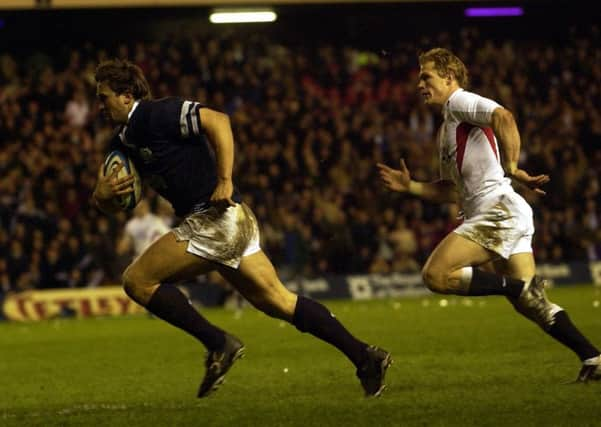Allan Massie: Russell and Hogg are due a big Six Nations game


Three or four have been dour games in which England themselves failed to cross the Scottish line. In contrast most matches at Twickenham, where we always lose, have been free-flowing affairs. Even in last year’s debacle, we scored three tries, two from Huw Jones, one from Gordon Reid. The discrepancy is bizarre.
Advertisement
Hide AdAdvertisement
Hide AdWhat of today then? England start favourites, as befits a side that has lost only one match since the 2015 World Cup when Eddie Jones took over the team that Stuart Lancaster had built. You can’t argue with that record, and would be a fool to try to do so. This is a very good England side, and it’s hard to see any weak element.
I guess it’s not – yet anyway – as good as the one which Martin Johnson captained to win the World Cup in 2003.
For one thing, today’s back-row of Courtney Lawes, Nathan Hughes and Chris Robshaw is a touch lacking in quality, certainly when compared to the 2003 one of Richard Hill, Lawrence Dallaglio and Neil Back. The back-row may be one of the few areas where Scotland have the upper hand – may.
There have been more sparkling English teams, but Jones has constructed an efficient one.
They give very little away, and with George Ford at 10 and Owen Farrell at 12, they have two players expert at controlling the rhythm and pattern of a match. Yet even the best players can be unsettled or have off-days. Ford is sometimes flaky and even Farrell, the outstanding 12 in the northern hemisphere, had a desperately poor match for Saracens against Clermont Auvergne at Allianz Park a few weeks ago.
Still, any Scot who looks for him to play as badly today would be clutching at straws.
Stuart Barnes, England fly-half in the amateur days, now a journalist who has not been an uncritical admirer of Jones’ team, wrote this week that there was no way Scotland could beat England today, no way because England were better in every respect, and were also, unlike Scotland, accustomed to winning.
For Scotland to win, England would have to beat themselves.
Perhaps, perhaps, but there is a lot of talent in this Scotland team, concerning which anyone who supposed that Gregor Townsend would drop Finn Russell is out of touch with reality. The English have told us they will target Russell – and quite right too.
Advertisement
Hide AdAdvertisement
Hide AdThey know that when Finn fires, Scotland fire – and I would guess that after two quiet games, neither half as bad as his critics have said, Finn is ready to fire.
How to beat England then?
Well, Ireland showed a way in Dublin last year. They played simple rugby, stopping England on the gain line, employing clever box-kicks which gave them a chance to regain possession and, most importantly, keeping control of the ball. They were so relentless that early in the second half they had acquired a moral ascendancy, even if the score was still close.
Scotland won’t, and probably can’t, play just like Ireland, but they can still take a lesson from them.
They will surely want to play a wider game, but, to do this successfully, they will first drive hard up the middle, as they did last week when Jonny Gray, Grant Gilchrist, Hamish Watson and Stuart McInally all made inroads into the French defence.
England tend to commit few to the breakdown. So the ball can be taken on by the next forward up.
Then, as Brian O’Driscoll remarked this week, the English rush defence, often very effective, tends to leave a considerable space between the line and Mike Brown at full-back – space which can be exploited by a clever chip or grubber.
One thing seems certain. Scotland won’t beat this England side only by trying to stop or smother them. They have to be creative, which means taking the occasional risk. They have the players to do this. In which connection one might add that if Russell hasn’t yet fired in the tournament, neither has Stuart Hogg.
Both are due a big match.
Finally the game is at Murrayfield. Forget the record of Calcutta Cup matches there; most involved different players. More relevant is the fact that since England last came to Edinburgh two years ago, Scotland have won at home against France (twice), Ireland, Wales, Italy, Australia, Samoa and Argentina, and have lost at Murrayfield only to Australia, by a single score, and New Zealand, in a match they came within inches of winning. So if Scotland can still be feeble away, this team is forming the winning habit at home.
Advertisement
Hide AdAdvertisement
Hide AdWay back in the early 1970s, Murrayfield was a place from which visitors, even the glorious Welsh team of Gareth, Phil, JPR, Gerald & Co were sent homeward, defeated. We talked then of Fortress Murrayfield. So forget away form – we scarcely ever won away in the Seventies either. A win today would see Murrayfield a fortress again.